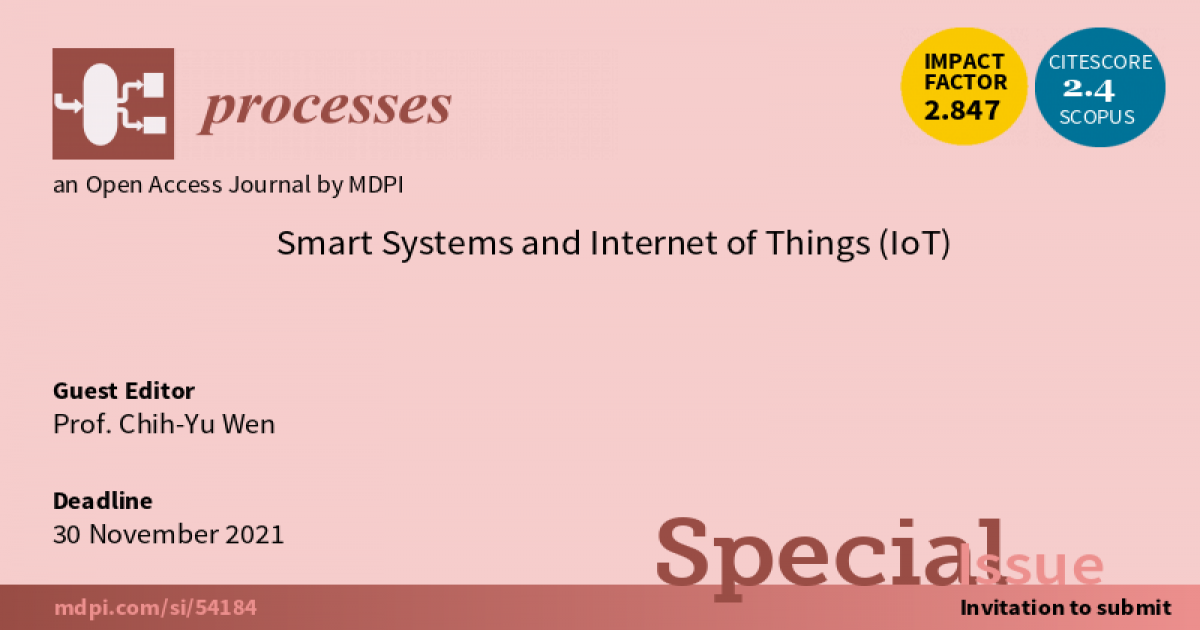- 2.8Impact Factor
- 5.5CiteScore
- 15 daysTime to First Decision
Smart Systems and Internet of Things (IoT)
This special issue belongs to the section “AI-Enabled Process Engineering“.
Special Issue Information
Dear Colleagues,
Smart systems integrate sensing, actuation, signal processing, and control in order to make decisions and create a smart environment. Smart system is the next generation of computing and information system, combining artificial intelligence, machine learning, cyber-physical systems, edge/cloud computing, pervasive/ubiquitous computing, big data analytics, and Internet of Things (IoT) technologies to provide real-time networked information and control, which considerably contributes to the development of the future IoT.
Due to the large diversity of IoT devices and technologies, the major challenges in smart systems are: how to design and build integrated smart systems? how to use computing technologies efficiently and effectively? This Special Issue aims at the theory and practice of smart systems and IoT technologies and welcomes original contributions and review papers that are relevant to the following potential areas:
- Computing Models and Algorithms for Smart Systems
- Artificial Intelligence and Machine Learning for Smart Systems
- Platforms for Smart Systems
- Smart Communication and Networking Technologies
- Big Data and Smart Systems
- Biometrics and Smart Systems
- Cloud/Edge/Fog Computing Technologies for Smart Systems
- System Design and Architecture for Smart Systems
- IoT and Industrial IoT Technologies for Smart Systems
- Interdisciplinary Technological Approaches and Solutions for Smart Systems
- Smart System Applications (e.g., smart security and surveillance systems, smart transportation systems, smart agriculture, smart healthcare systems, unmanned systems, smart energy management, smart logistics and supply chain management systems)
Prof. Chih-Yu Wen
Guest Editor
Manuscript Submission Information
Manuscripts should be submitted online at www.mdpi.com by registering and logging in to this website. Once you are registered, click here to go to the submission form. Manuscripts can be submitted until the deadline. All submissions that pass pre-check are peer-reviewed. Accepted papers will be published continuously in the journal (as soon as accepted) and will be listed together on the special issue website. Research articles, review articles as well as short communications are invited. For planned papers, a title and short abstract (about 250 words) can be sent to the Editorial Office for assessment.
Submitted manuscripts should not have been published previously, nor be under consideration for publication elsewhere (except conference proceedings papers). All manuscripts are thoroughly refereed through a single-blind peer-review process. A guide for authors and other relevant information for submission of manuscripts is available on the Instructions for Authors page. Processes is an international peer-reviewed open access semimonthly journal published by MDPI.
Please visit the Instructions for Authors page before submitting a manuscript. The Article Processing Charge (APC) for publication in this open access journal is 2400 CHF (Swiss Francs). Submitted papers should be well formatted and use good English. Authors may use MDPI's English editing service prior to publication or during author revisions.
Keywords
- Smart System
- Internet of Things
- Computing Technologies
- System Applications
- Artificial Intelligence
- Machine Learning
- System Design and Architecture
- System Platforms

Benefits of Publishing in a Special Issue
- Ease of navigation: Grouping papers by topic helps scholars navigate broad scope journals more efficiently.
- Greater discoverability: Special Issues support the reach and impact of scientific research. Articles in Special Issues are more discoverable and cited more frequently.
- Expansion of research network: Special Issues facilitate connections among authors, fostering scientific collaborations.
- External promotion: Articles in Special Issues are often promoted through the journal's social media, increasing their visibility.
- Reprint: MDPI Books provides the opportunity to republish successful Special Issues in book format, both online and in print.


